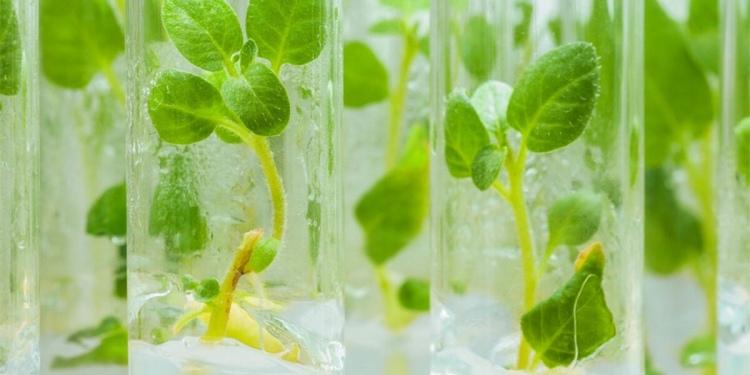Critical shortage of quality seed of productive and adaptive varieties is probably the major constraint to potato production in SSA countries. The yield and quality of potato produced is dependent on the quality of seed potato planted. Most smallholder farmers in SSA recycle seed potatoes for several seasons, resulting in low yields of inferior quality due to seed degeneration, which is caused by seed-borne diseases. It is also known that many smallholder farmers save from their harvests small tubers which they cannot sell as seed increasing the probability of virus infection, including very important yield reducing viruses: potato leaf roll virus (PLRV) and potato virus Y (PVY). Still worse is that there are farmers who use for seed ware potato they buy from unknown sources increasing the chances of not only spreading viruses, but also bacterial wilt (BW) dissemination caused by Ralstonia solancearum, among several other seed-borne diseases that are known to reduce yield.
Being aware of this very dangerous trend, public research organizations, commercial farmers, NGOs and the private sector have supported the production of better quality seed through formal, intermediate (also called alternative) and informal seed systems. The formal seed system, which follows strict production and seed certification procedures, is a most sure way to produce quality seed. The strictest seed potato certification is practiced in Kenya by the Kenya Plant Health Inspectorate Service (KEPHIS). However, the formal seed covers only less than 5% of potato seed requirements in most successful countries like Kenya, and remains less than 3% in most SSA countries. This system produces expensive seed that farmers cannot easily afford, and production is limited to only a few locations increasing transportation costs to reach the farmers. This coupled with small quantity it produces does not make it an effective problem solver but a foundation for subsequent systems. The alternative or intermediate system has both the formal and informal components and is produced closer to farmers. This system mostly follows a quality declared seed (QDS) production system following certain criteria, which may vary among countries. In Ethiopia, while it is less strict than the formal with regards to virus infection and purity, it has zero tolerance to BW, as it is the most devastating disease of the potato in the country. Kenya also has zero tolerance to BW. This kind of seed is produced by trained commercial farmers, cooperatives and some advanced smallholder farmers. These producers get basic seed from research centers (formal system) and further bulk the seed to get quantities under QDS regulations. The seed they produce is inspected by government inspectors, for example, in Ethiopia both in the field and in the store (diffused light store, DLS). This seed can be infected with BW in the process of QDS production if the soil is infested with the bacterium. Unfortunately, this cannot be easily detected by inspectors because they conduct only visual inspection.
To put a strong quality seed production system in place to improve the performance of the three systems discussed above, availability of clean early generation seed potato is a prerequisite. Most countries in SSA, among others, Burundi, Ethiopia, Kenya, Malawi, Rwanda, Tanzania and Uganda have basic infrastructure, including tissue culture laboratories, aeroponics and screen houses where clean minitubers are being produced from in-vitro plantlets. In some of these countries, aeroponics units have not been efficiently utilized due to power outage and scarcity of nutrients. Moreover, it is evident to note that there is a possibility of disseminating BW with early generation seed because testing for BW at every stage of early generation seed production starting from minitubers is not strictly implemented. Some studies have shown that BW has been disseminated to non-traditional highland areas with seed movement probably from research centers.
Despite all this, some trends in relation to quality seed production are encouraging, for example, Kisima farm produces about 200 ha of seed potato per year that is officially certified to be clean. In Ethiopia, many cooperatives and some commercial farmers also produce QDS that has acceptable quality, which is a step in the right direction. Any support accorded to the production of quality seed to sell to potato producers in SSA will contribute to the transformation of the potato industry, enabling it to significantly contribute to household food security and income and to the macro-economy of respective countries.
Kisima Farm is the largest certified seed potato producer in Kenya supplying about 75% of the total certified seed potato that available in the country. It produces seed potato for farmers preferred varieties that are mainly KALRO/CIP bred and some HZPC varieties based on demand. Annually, it produces over 4000 MT of potatoes of which 75% is qualified as seed with a tuber size of 28-45 mm (size 1), and, 45-60mm (size 2). To ensure that the seed potato it produces is clean, it starts from in-vitro plantlets that it procures from GTIL and Stokmen Rozen and grows in aeroponics to produce minitubers that are later bulked to quantity in clean soil.
Many small-scale seed multipliers either individually or organized in groups have started growing quality seed from the certified seed they buy from Kisima farm, which they sell to other potato farmers. These farmers have made a lot of money as their yields increased by about 60%, which resulted in a corresponding increase in household income. Farmers do not always have to travel long distances to Kisima to get quality seed because such small-scale seed producers make it available close to them.







